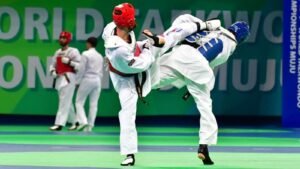
Bengaluru: The Indian women’s team stood outside the Budapest Olympic Sports and Conference center after their final-round win on Sunday, overjoyed, but wary of a jinx. The match between USA and Kazakhstan was underway. The ordeal was soon over with a drawn result and the Indian women walked into history with a first-ever gold.

Harika Dronavalli waited 20 years for this moment.
She played in the 2004 Olympiad when she was 13. India finished ninth that year. Tall for her age as a teen, Harika rarely got toys on long flights but she was the kid of the team. Now a veteran, she has seen the arc of Indian women’s chess — from being one of two female GMs alongside Koneru Humpy to watching Vaishali Rameshbabu join them and this wave of young players stepping up at the Olympiad.
It’s taken a while but Harika finally has the gold she dreamed of, that saw her show up for the tournament last time well into her final trimester of pregnancy. USA denied them the gold two years ago after India went into the final round in sole lead. This time around, Harika hasn’t exactly had a great run on the top board, but a win on the final day and a gold in her cabin baggage should do.
India went into the final round in a shared lead with Kazakhstan. India bludgeoned Azerbaijan 3.5-0.5 and other results too went their way.
“We’re very happy to have finally won,” Vaishali beamed. “I still remember how painful it was last time when we lost in the last round. Honestly, I could not sleep last night thinking about it.”
Apart from the team gold, the Indian women also won two individual gold medals. Divya Deshmukh on Board 3, and Vantika Agrawal on Board 4, with a performance rating of 2608 and 2558 respectively, added to India’s tally of individual medals. Divya had a stellar 9.5/11 run, staying unbeaten through the tournament. Almost always, the team counted on her to bring home a point. She moved up to world No.11 in the rankings, the second-highest ranked women’s player after Humpy and has touched Elo 2500 in the live ratings. Even up against an assortment of challenges — time trouble, nerves and GM opponents — she shone, prevailed and has only begun her climb. Vantika was valuable on Board 4 with a 7.5/9 performance.
“The last two days I was so stressed over what’s going to happen,” Vantika told Chess.com. “Now that we’ve won with such a high score, I’m feeling really happy.”
Tania Sachdev, who was rested for the final round, watched history unfold from the sidelines. “It was hard to celebrate our bronze last time. Now when I look back, this is the moment that we were meant for,” she said.
Tania and Vantika were part of a seven-member Indian women’s player group that traveled to Budapest to train under Hungarian Grandmaster, former world No.8 and arguably the greatest female chess player, Judit Polgar, in January this year. For two weeks, they trained for eight hours daily with no breaks. Judit wanted to familiarize them with the rigors of top chess. It’s a nice touch that the Indian women won their path-breaking gold in the land of the Polgar sisters.
Growing up, Judit along with her sisters — Susan and Sofia — were initiated into chess by their father, Laszlo Polgar. He believed that talent could be created and nurtured at home. Susan became Grandmaster and women’s world No.1 at 15, Sofia touched a performance rating of 2879 in a single tournament at 14 and Judit, the youngest of three siblings featured among the world’s top 10 Grandmasters for over a decade.
Much like in the Open team, a certain Anand had a role to play in nurturing some of these players too. This is a defining moment for Indian women’s chess.
A generation of young, aspiring chess players maybe, many years from now, point to this moment. In chess, the proportion of women players is significantly lower than that of men, with pretty high drop-out rates once they hit teens. It’s not easy to survive in a game where they’re seen as inferior to men. There are also the added demons of harassment, and more being spoken of how female players look and what they wear than their games.
Players on this gold-medal winning team have faced it and might continue to face it. It might not be enough to deter them.







